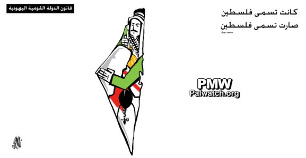Fatah map presents map of Israel and the Palestinian Authority areas as “Palestine”

Cartoon posted on the website of the Fatah Commission of Information, Culture, and Ideology
The cartoon shows the PA map of “Palestine” that presents all of Israel as “Palestine” together with the PA areas. The drawings over the map show a man wearing an Arab headdress with an ammunition belt across his chest holding a rifle in one hand while embracing the Dome of the Rock with the other, and at the bottom is what appears to be the back of a girl’s head with a key symbolizing the “right of return” attached to the end of her braid.
Posted text: “‘It was called Palestine
And it is still called Palestine’
[Palestinian poet] Mahmoud Darwish”
Mahmoud Darwish is considered the Palestinian national poet. He published over 30 volumes of poetry and 8 books of prose and has won numerous awards. He joined the Israeli Communist Party in 1961 and the terrorist organization PLO in 1973, becoming a member of the PLO Executive Committee in 1987. He left the PLO in 1993 because it signed the Oslo Accords with Israel.
Many in Israel see his poetry as inciting hate and violence. One poem he wrote in 1988 at the height of the Palestinian wave of violence and terror against Israel in which approximately 200 Israelis were murdered (the first Intifada, 1987-1993) calls to Israelis: “Take your portion of our blood - and be gone… Live wherever you like, but do not live among us… Die wherever you like, but do not die among us… Leave our country, our land, our sea, our wheat, our salt, our wounds, everything, and leave the memories of memory.”
In 1964, he wrote a poem entitled "ID Card" in which he said: "I do not hate people, And I do not steal from anyone, But if I starve I will eat my oppressors' flesh; Beware, beware of my starving, And my rage."
He also wrote “Silence for the Sake of Gaza” in 1973, which many see as glorifying terror: “She wraps explosives around her waist and blows herself up. It is not a death, and not a suicide. It is Gaza's way of declaring she is worthy of life.”
His defenders have claimed that Israel misinterprets his poetry and that he sought reconciliation with Israel. One wrote in 2017: “Darwish arranged meetings between Palestinian and Israeli intellectuals, and published essays on their discussions. He was optimistic that, through mutual understanding, the two sides could eventually reconcile.” [https://www.bcalnoor.org/]